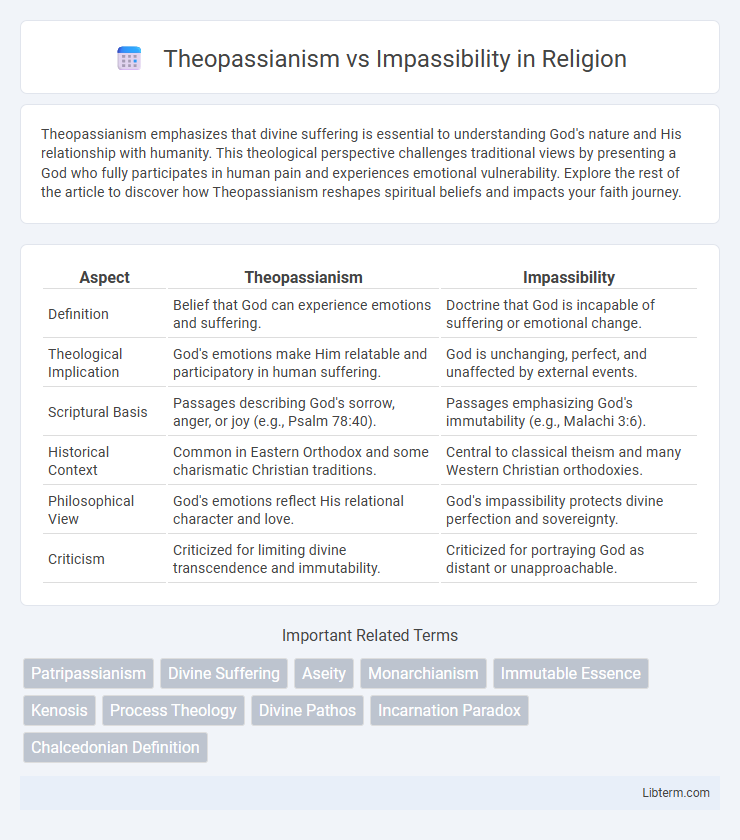Theopassianism emphasizes that divine suffering is essential to understanding God's nature and His relationship with humanity. This theological perspective challenges traditional views by presenting a God who fully participates in human pain and experiences emotional vulnerability. Explore the rest of the article to discover how Theopassianism reshapes spiritual beliefs and impacts your faith journey.
Table of Comparison
| Aspect | Theopassianism | Impassibility |
|---|---|---|
| Definition | Belief that God can experience emotions and suffering. | Doctrine that God is incapable of suffering or emotional change. |
| Theological Implication | God's emotions make Him relatable and participatory in human suffering. | God is unchanging, perfect, and unaffected by external events. |
| Scriptural Basis | Passages describing God's sorrow, anger, or joy (e.g., Psalm 78:40). | Passages emphasizing God's immutability (e.g., Malachi 3:6). |
| Historical Context | Common in Eastern Orthodox and some charismatic Christian traditions. | Central to classical theism and many Western Christian orthodoxies. |
| Philosophical View | God's emotions reflect His relational character and love. | God's impassibility protects divine perfection and sovereignty. |
| Criticism | Criticized for limiting divine transcendence and immutability. | Criticized for portraying God as distant or unapproachable. |
Introduction to Theopassianism and Divine Impassibility
Theopassianism asserts that God experiences emotions and can suffer, emphasizing a dynamic relationship between the divine and creation. Divine Impassibility, by contrast, holds that God is immutable and incapable of suffering or emotional change, maintaining perfect transcendence and self-possession. These contrasting views influence theological perspectives on God's interaction with human experiences and the nature of divine love.
Historical Origins and Development
Theopassianism, which asserts that God can experience suffering and emotional change, traces its origins to early Christian theologians like Origen and Gregory of Nyssa, who emphasized God's relational nature. In contrast, the doctrine of Divine Impassibility, firmly rooted in classical Greek philosophy and developed by Augustine and Aquinas, maintains that God is immutable and incapable of suffering or emotional fluctuations. The historical development of these doctrines reflects a theological tension between affirming God's transcendence and engaging with the experiential realities of human suffering and divine empathy.
Key Theological Definitions
Theopassianism posits that God experiences suffering and emotional change, emphasizing a theology where divine passibility reflects a responsive and relational deity. Impassibility asserts God's nature as unchanging and incapable of suffering, underscoring God's transcendence and eternal perfection free from emotional fluctuation. Key theological definitions distinguish Theopassianism as the belief in a "passible" God who participates in human suffering, while Impassibility defines God as "impassible," maintaining immutability and freedom from pain.
Philosophical Foundations
Theopassianism asserts that God experiences emotional suffering, emphasizing a relational and dynamic divine nature, which aligns with process theology and challenges classical theism's immutability doctrine. Impassibility, rooted in Aristotelian and Thomistic philosophy, maintains that God is incapable of suffering or emotional change, preserving divine perfection and immutability. This philosophical divergence impacts how divine attributes such as omniscience, omnipotence, and benevolence are understood, shaping theological interpretations of providence and human suffering.
Biblical Interpretations and Scriptural Basis
Theopassianism asserts that God can experience suffering or pass through emotional states, grounded in biblical passages such as Isaiah 53:3-5 and Hebrews 4:15, which depict the suffering of Christ as divine. In contrast, Impassibility emphasizes God's inability to suffer or change, supported by scriptures like Malachi 3:6 and James 1:17, highlighting God's unchanging and immutable nature. The debate hinges on reconciling Christ's human suffering with God's divine impassibility, intertwining theological interpretations of scripture concerning God's nature and Christ's incarnation.
Major Proponents and Critics
Theopassianism, defended by theologians such as Hans Urs von Balthasar and Jurgen Moltmann, emphasizes God's capacity to suffer and experience emotions, challenging classical impassibility doctrines. Classical impassibility is upheld by figures like Thomas Aquinas and Augustine, who argue that God's nature, being perfect and immutable, precludes suffering or emotional change. Critics of Theopassianism contend it risks anthropomorphizing God, while critics of impassibility argue it renders God emotionally distant and incompatible with a relational Godhead.
Theopassianism in Contemporary Theology
Theopassianism in contemporary theology emphasizes God's experiential participation in suffering, challenging traditional notions of divine impassibility. This perspective argues that God's capacity to suffer fosters a relational and empathetic God who is dynamically involved in human pain and history. Theopassianism reshapes theological discourse by proposing that divine love and compassion are authentically expressed through God's openness to emotional and physical vulnerability.
Impassibility: Modern Defenses and Challenges
Impassibility, the doctrine that God does not experience pain or suffering, faces modern challenges that question its compatibility with a relational and loving deity. Contemporary theologians defend impassibility by emphasizing divine transcendence and immutability, arguing that God's emotions differ fundamentally from human feelings. Critics highlight biblical narratives portraying God as responsive and affected by creation, prompting reevaluation of impassibility in light of God's empathetic interactions.
Comparative Implications for Christology
Theopassianism asserts that God the Son experiences suffering and change, challenging classical doctrines of divine impassibility which emphasize God's unchangeableness and freedom from suffering. This theological tension significantly impacts Christology by redefining the nature of the Incarnation and the extent of Christ's experiential participation in human suffering. Comparative study reveals that adopting Theopassianism can deepen Christ's relational identity with humanity, while maintaining impassibility preserves divine transcendence and immutability in traditional Christological frameworks.
Conclusion: Theological Significance and Ongoing Debates
Theopassianism asserts that God experiences suffering, emphasizing divine empathy and relational engagement, while Impassibility maintains God's freedom from suffering, underscoring divine immutability and transcendence. This theological tension influences doctrines of divine nature, salvation, and prayer, sparking ongoing debates in systematic theology and pastoral ministry. Contemporary scholarship continues to explore these perspectives to reconcile God's personal intimacy with unchanging perfection.
Theopassianism Infographic

 libterm.com
libterm.com